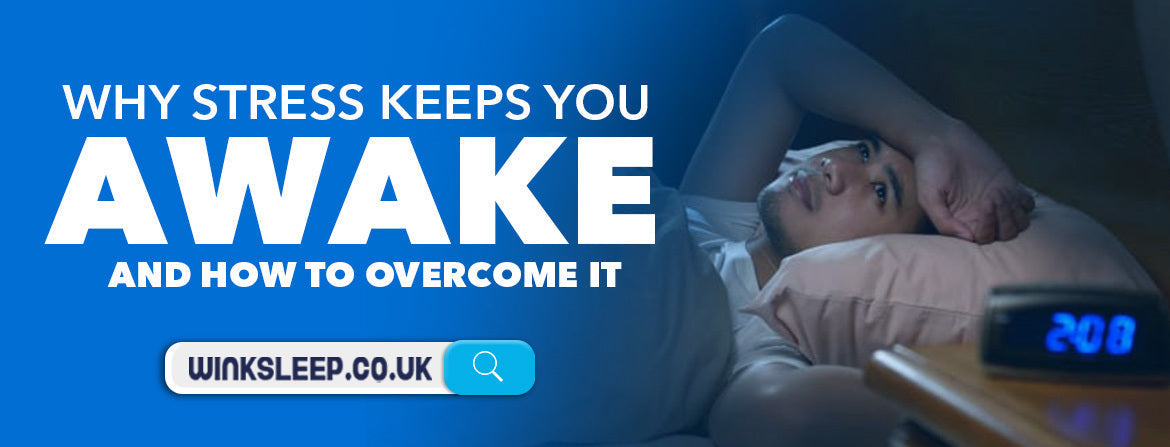Stress can significantly impact your sleep, leading to restless nights and difficulty falling or staying asleep. When you're stressed, your body goes into a "fight or flight" response, releasing hormones like cortisol and adrenaline, which can make you feel alert and tense.
This heightened state of arousal can prevent your mind from relaxing, making it challenging to drift off to sleep. Additionally, stress often leads to racing thoughts, anxiety, and an inability to unwind, all of which contribute to insomnia and disturbed sleep cycles.
To overcome stress-induced sleeplessness, it’s important to adopt strategies that promote relaxation and help regulate your stress levels. Practices such as deep breathing, meditation, and mindfulness can calm the nervous system, reducing the impact of stress on your body. Creating a bedtime routine that includes winding down activities, limiting screen time, and keeping a consistent sleep schedule can also help signal to your body that it’s time to rest.
Managing stress through regular exercise and healthy lifestyle choices further supports better sleep and overall well-being.
The Science Behind Stress and Sleep Disruption
When you experience stress, your body releases hormones like cortisol and adrenaline, which prepare you to handle perceived threats. While this response is beneficial in dangerous situations, chronic stress keeps these hormones elevated, disrupting your natural sleep-wake cycle.
Key Ways Stress Impacts Sleep:
- Increased Cortisol Levels: High cortisol levels make it harder for your body to wind down at night, leading to delayed sleep onset.
- Overactive Mind: Racing thoughts and worry prevent relaxation, making it difficult to transition into deeper sleep stages.
- Physical Tension: Stress often causes muscle tension and restlessness, making your body uncomfortable and interrupting sleep.
- Sleep Fragmentation: Even if you fall asleep, stress can cause frequent awakenings, resulting in poor-quality rest.
Common Causes of Stress-Related Insomnia
Several stressors contribute to sleepless nights. Identifying these triggers is the first step toward improving your sleep habits:
- Work-Related Stress: Deadlines, long hours, and job insecurity can cause chronic stress.
- Financial Concerns: Worrying about bills and expenses can keep your mind active at night.
- Relationship Issues: Conflicts and emotional distress often lead to prolonged rumination.
- Major Life Changes: Events like moving, starting a new job, or dealing with loss can temporarily increase stress levels.
Practical Strategies to Manage Stress and Sleep Better
Improving sleep requires addressing both the physical and psychological effects of stress. Here are evidence-based techniques to promote relaxation and enhance sleep quality:
1. Establish a Consistent Bedtime Routine
A regular pre-sleep routine signals to your brain that it’s time to wind down. Consider activities like:
- Reading a book
- Taking a warm bath
- Practicing gentle stretching or yoga
2. Practice Relaxation Techniques
Relaxation strategies help lower cortisol and reduce muscle tension:
- Deep Breathing Exercises: Focus on slow, deep breaths to calm your nervous system.
- Progressive Muscle Relaxation: Tense and release muscle groups to promote relaxation.
- Meditation and Mindfulness: Techniques like guided imagery and mindfulness meditation improve focus and ease anxiety.
3. Limit Stimulants and Electronics Before Bed
Avoid caffeine, nicotine, and alcohol in the hours leading up to sleep.
Limit screen time from phones, computers, and TVs, as blue light suppresses melatonin production.
4. Create a Sleep-Friendly Environment
- Keep the Bedroom Dark and Cool: A cool, dark room promotes melatonin production and improves sleep quality.
- Use Comfortable Bedding: Invest in a supportive mattress and pillows to enhance comfort.
- Minimise Noise: Use earplugs or white noise machines to block disruptive sounds.
5. Set Boundaries with Stressful Thoughts
Journaling: Write down worries before bed to offload them from your mind.
Scheduled Worry Time: Allocate a specific time earlier in the day to reflect on problems, freeing your evening for relaxation.
When to Seek Professional Help
If stress-related sleep problems persist despite self-help strategies, it may be time to consult a professional. Options include:
- Cognitive Behavioral Therapy for Insomnia (CBT-I): This evidence-based therapy addresses negative thought patterns contributing to sleep issues.
- Stress Management Programs: These programs provide personalised strategies to handle stress more effectively.
Also read: The science of sleep - Why your mattress matters
Conclusion
Stress is a common culprit behind sleepless nights, but it doesn’t have to dominate your rest. By understanding the relationship between stress and sleep, implementing relaxation techniques, and creating a sleep-conducive environment, you can break the cycle of stress-induced insomnia. Prioritising stress management and healthy sleep habits will lead to better rest, improved health, and enhanced well-being.
FAQs
How does stress affect sleep quality?
Stress increases cortisol and adrenaline levels, leading to overactive thoughts, muscle tension, and sleep fragmentation.
Can relaxation techniques really help with stress-induced insomnia?
Yes, deep breathing, mindfulness, and progressive muscle relaxation are proven to reduce cortisol and promote better sleep.
How can I calm my mind before bed when I feel stressed?
Establish a calming bedtime routine, avoid screens, and practice journaling to offload worries before sleep.
Is it safe to use medication for sleep problems caused by stress?
Medication can be helpful short-term but consult a healthcare provider for appropriate guidance and long-term strategies.
What is Cognitive Behavioral Therapy for Insomnia (CBT-I)?
CBT-I is a structured, evidence-based therapy that targets negative thought patterns and habits affecting sleep.
How can a sleep-friendly environment reduce stress at night?
A cool, dark, and quiet bedroom with comfortable bedding helps create a relaxing atmosphere conducive to better sleep.
 Build Your Bed
Build Your Bed
 Request FREE Swatches
Request FREE Swatches
 Fast Delivery on Every Product
Fast Delivery on Every Product  Klarna 0% Finance
Klarna 0% Finance  5 Year Manufacturer's Guarantee
5 Year Manufacturer's Guarantee 










